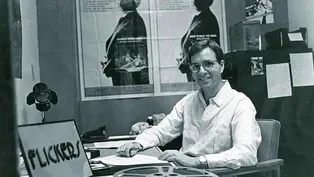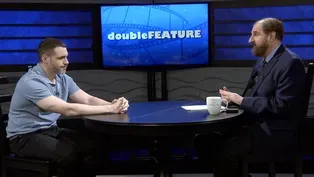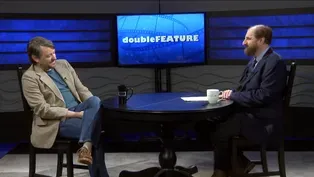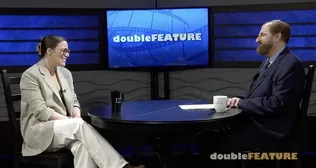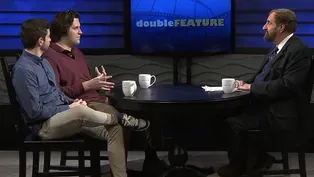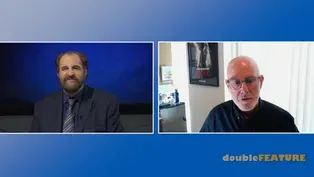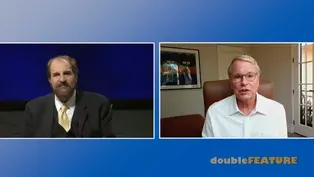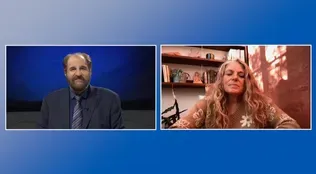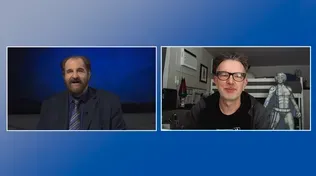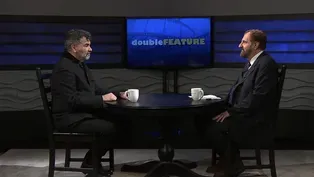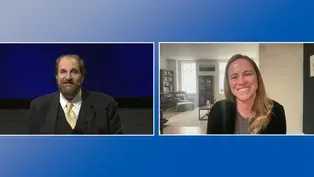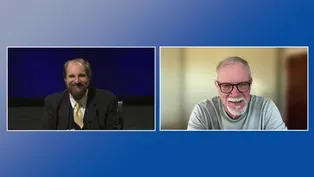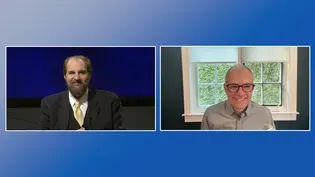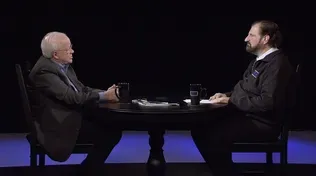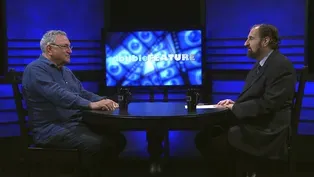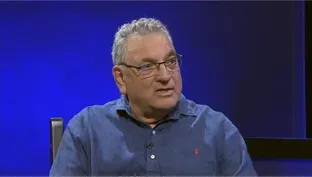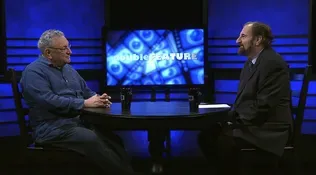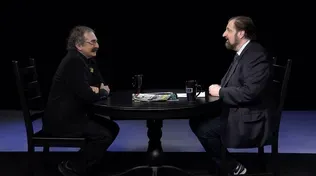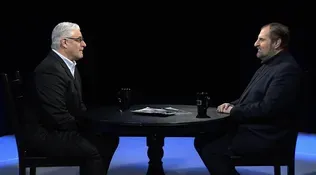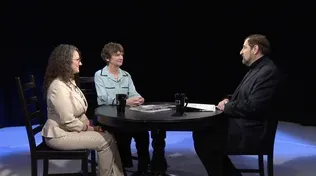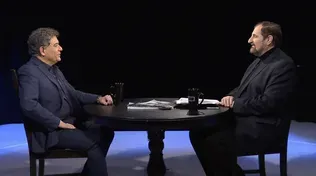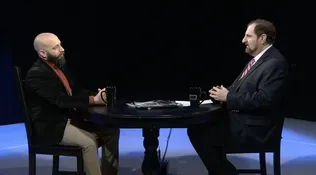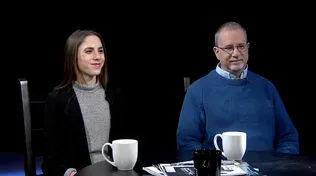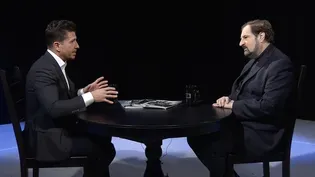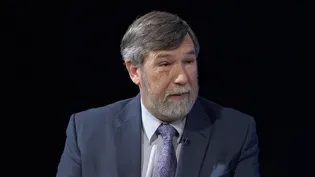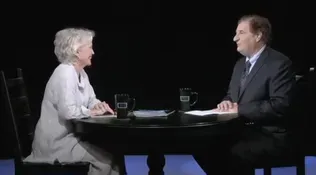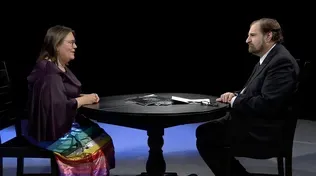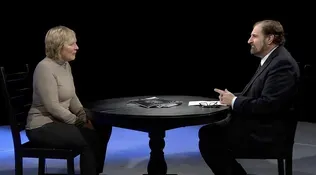
Interview with Chad Verdi Jr. and Paul Luba
Clip | 45m 31sVideo has Closed Captions
DoubleFeature shows films from around the world and takes viewers behind the scenes.
Steven Feinberg interviews local Rhode Island producer team, Chad Verdi Jr. and Paul Luba, followed by a screening of the short film "The Speed of Sound."
Problems with Closed Captions? Closed Captioning Feedback
Problems with Closed Captions? Closed Captioning Feedback
doubleFEATURE is a local public television program presented by Rhode Island PBS

Interview with Chad Verdi Jr. and Paul Luba
Clip | 45m 31sVideo has Closed Captions
Steven Feinberg interviews local Rhode Island producer team, Chad Verdi Jr. and Paul Luba, followed by a screening of the short film "The Speed of Sound."
Problems with Closed Captions? Closed Captioning Feedback
How to Watch doubleFEATURE
doubleFEATURE is available to stream on pbs.org and the free PBS App, available on iPhone, Apple TV, Android TV, Android smartphones, Amazon Fire TV, Amazon Fire Tablet, Roku, Samsung Smart TV, and Vizio.
(gentle music) - Hi, I'm Steven Feinberg, executive director of the Rhode Island Film and Television Office.
Our guests tonight are two extraordinary young producers.
They're here from Rhode Island.
They are business partners.
They've been making a whole new generation of films right here in our state.
I wanna welcome Chad Verdi Jr. and Paul Luba to Double Feature.
Thank you guys so much for coming and taking time out of your busy schedules.
You've got a slew of movies that are either in preparation, or in post-production, or in development.
So thank you guys so much for coming.
- Of course!
Well Steve, thank you for having us.
We're absolutely excited to be here.
This is gonna be fun.
- Wonderful.
So how long have you guys been working together?
- [Chad] I'd say 2019, right?
- Yeah, we've been working together since Chad moved back to Rhode Island with his family in 2019.
So, yeah.
- And Chad, your dad and your mom have been making movies since probably, maybe, I don't know, 2009 maybe?
- 2008, yeah, exactly.
- 2008.
- Yup.
- 2009.
And they utilized the motion picture tax incentive, which the whole point of that was to start to bring more productions to Rhode Island, and also to get productions to sprout from Rhode Island, while at the same time helping a new generation of Rhode Islanders and local folks start to gain experience.
And that included both of you guys, right?
- Yes.
- You started out as production assistants, correct?
- Absolutely, yeah!
- Yes.
- Yup, exactly.
So my first take into film was actually through my father, like you said, around 2008.
My father started first making films here in Rhode Island, with his first movie, Inkubus.
And- - [Steve] With with Richard Englund who was - [Chad] With Robert Englund, yes.
- [Steve] Robert England.
- [Chad] Yes, yes, sir.
- [Steve] Who was Freddie Krueger.
- Yes, the original Freddie Krueger.
Robert England was in Inkubus, as well as Joey Fatone was in that movie, who was from N'Sync, which is pretty cool.
- [Steve] Yep.
- So he started off with that movie back in 2008, and that was my first experience on a film set.
I worked part-time after school.
I was going to LaSalle at the time, and I would come right after school, go to his movie sets.
'Cause at the time- - And that was at the Cranston- - Police.
- Police Station.
- Yeah, exactly.
- Which has been knocked down.
- Yeah, yeah, unfortunately.
There's a little film history there.
There was.
- Right, right.
- And so I would go there right after school, actually, with my older sister Kelsey.
And we would spend a couple hours every day just doing some production office work, working around with the other production assistants, and doing some office coordination, which was pretty cool.
And then that's kinda how I first started off.
And then a few years later, actually a good friend of yours, Tom DeNucci, had his directing debut with my father called Self Storage.
And that was my first time that I was able to come onto set and work full time as a production assistant.
And that was one of my, honestly, one of my favorite movie sets of all time.
- That was Eric Roberts, right?
- Yes, yep, Jonathan Silverman, Eric Roberts.
We also had, Michael Berryman was in there as well.
- Yes, yes, yes.
- Yep.
And we filmed it all at a local self storage unit facility in East Greenwich.
And the shooting schedule for that, this being, again, my first time working on a set full time as a production assistant was about four p.m. to four a.m. every single day.
- [Steve] Because you're in high school.
- Exactly.
This was the summer going into, I believe, my junior year of high school, maybe my senior year.
So it was 2010, 2011.
And I worked for a full three weeks or four weeks I believe we filmed four.
And it was a complete, you know, obviously schedule shift from four p.m. to four a.m., getting used to that, but also just being exposed to film.
It was really amazing.
I had a great time.
- And you made yourself useful?
- I tried to.
I like to believe I did, yeah.
- Yeah, right, right.
And Paul, you started on which one?
- Yeah, for me, I started on Saving Christmas.
I was in the fold, the bid after Chad Jr.
I wanna say 2016.
- Had you guys met at LaSalle?
- No.
- No, no.
- You went to, he went to Moses Brown.
- Yes, right.
- I went to LaSalle.
- Yeah.
- Okay.
- And- - I'm sure we crossed paths prior.
- Yeah, we- - But we never officially met.
- We know a lot of the same people.
We have mutual connections, so we're always like, oh, we probably at one point did cross paths.
But when I was out of college in 2016, I was gonna become a lawyer.
And every, I'd always been interested in film.
I'd taken a few film classes in college.
And everyone was telling me, well, if you're in a film, you have to move to LA, you have to move to New York.
So I was, before I was gonna study for the LSATs and take the LSATs, and really commit to being a lawyer, I was like, I'm gonna spend a year trying to find jobs in the film industry and see if I can turn this into some sort of stable career in the industry.
So I reached out to a lot of films for internships or as a PA.
But when I reached out to Chad's father, Chad Sr., he responded back, and then we were able to meet, and he set me up with a lot of this local filmmaker, basically like a web, kind of like a network of local filmmakers in Rhode Island.
And that's how I was able to become attached.
I was a intern PA on Saving Christmas in 2017.
- But that's with Ed Asner, right?
- Right, yep, with Ed.
- And Tom directed that one.
- Yes, right, exactly.
And then I kept interning for Chad's father, and I became his assistant for a few years.
And while I was doing films with him, I was also kind of like a paralegal too.
So I was, you know, still deciding if I could, you know, turn this career into like a full-time gig.
And eventually I gained enough experience and made enough connections in the film industry that I was able to turn it into a full-time path.
Chad Jr. moved back, and he and I started handling a lot of the smaller films while, you know, also working for Chad's father on the larger scale films that he has in Rhode Island as well.
- And Chad, you had gone to Colorado for college, right?
- That is correct, yeah.
- So while he's working with your dad, Chad Sr., you're in Colorado.
- Yep.
- What are you studying in Colorado?
- So I actually graduated from CU Boulder with a degree in philosophy and a minor in history.
- [Steve] Okay.
- So not film at all.
- [Steve] No.
- And when I first expressed interest in the film industry to my father, my father was like, you know what?
I don't think anybody should- - [Steve] What are you nuts?
- Yeah, exactly.
He was like, I don't think anybody in my family should moving into this industry.
Unfortunately, I was a little too stubborn for him.
I graduated from school, and then moved back to Rhode Island to pursue a career in film.
Obviously using a lot of the connections and the path my father paved for me.
- Yep.
- And trying to just, you know, build off of that and hopefully continue to grow and get better and better.
- And I'll like say this similar to him, my parents, my family, my friends, almost everyone I knew told me I was crazy for- - Absolutely.
- Not only pursuing a career in this very competitive industry, but doing it in Rhode Island of all places.
- Yeah.
- And I feel like people don't realize that it's a new age, and there's a lot of stuff occurring all over.
You don't have to be a New York or LA to have a stable career in this industry and this field.
- I have to tell you, you know, you can't tell, but my whole body right now is tingling because I'm so happy to hear it, because that was my dream 20 years ago.
- [Paul] Yeah.
- Of starting a film industry here and incentivizing a film industry, getting a whole new generation of filmmakers.
And you guys have been, I love going to your sets.
- [Chad] Well, thank you.
- When I go, you have to understand, when we started this program in 2004, it was a lot of older people on the sets.
Those were the crew, and they were mostly white old guys.
And now it's multi-generational, but multi-cultural.
- [Paul] Yep.
- A lot of the younger people are getting opportunities, and they're men and women and diversity.
And when I go onto your set, they're getting younger and younger.
- Yeah, yep.
- But you're giving people opportunities.
Like, we'll get phone calls from someone who might have just graduated from URI, and they were taking a media class at the Harrington School, or Rick, or New England Tech, or whatever.
And I always say to you guys, "Hey, do you need somebody?"
And you always say, "We're always open to having someone who's, you know, positive energy, responsible, resourceful, team player."
- Yeah.
- Enthusiastic.
And then I see a lot of those opportunities.
Those people stay on your team.
- Yeah.
- Totally.
I mean, you know, when I was first trying to find an internship or anything like that in this field, it was, I had a very hard time for the first like several months or eight months.
So anytime that you have someone or someone reaches out to Chad Jr. or myself that says, "Hey, like, we're trying to be on the ground, we're trying to intern, we're trying to learn, you know."
We're very accepting of that, so yeah.
- I think that's great.
So when you, so you have the lawyerly background, right?
- Yeah.
- So you can look at contracts and things of that nature.
- Right, yeah.
You know, so that obviously, you know, people think of filmmaking, they only think of like the cameras, and like the lights and all that.
But my legal background was able to give me an avenue that not many people had.
- Yeah.
- And you know, I do, you know, I am in charge of a lot of the paperwork, and like, kind of like the contracts and all that.
- Well, I'll be very frank.
When you guys and my assistant who retired, Carol, would say when you guys submitted your applications, that you guys always have everything in order.
- [Paul] Right, yeah.
- And she was- - [Chad] We tried to.
- She goes, "Yeah, well, they do a great job.
There might be one, something, it's pretty complex pieces of legal work.
- [Paul] Right.
- But she always would say, and you guys always had it in order.
I think you should be proud of- - Yeah, that's mainly him, you know?
- I mean, it's a me but we also have like a team now, you know?
- [Steve] You have a template, protocol.
- Right, right.
- We have a few people in the office now.
You know, it's kind of expanded, you know?
- Yeah.
- First I was Chad Sr.'s assistant, and then Chad Jr. came.
Now we have an office of like four or five full-time individuals.
- And now you guys have two separate companies, Hyperborea?
- [Chad] Correct, Hyperborea films.
- And La Salle.
- Yes, correct.
- Yep.
- Okay, so what's Hyperborea?
- Yeah, no, I'd love to explain it.
So again, I think this comes from the fact that my father kind of didn't want me in film at first.
And so when I moved back to pursue it, he was like, "Listen, you know, I'll help you a little bit, but you gotta, you know, figure stuff out on your own as well."
- [Steve] Because he's Verdi films.
- Exactly, he's Verdi Productions.
He's the one that does the big glamorous films that we all wish we could be a part of.
And sometimes we're fortunate enough to be a part of 'em.
- [Steve] Yep.
- And he's able to also draw a lot of attention to Paul and I, and also to the state of Rhode Island and try and help bring films here as well.
So- - And by the way, so some of those projects include Bleed For This.
- Yep.
- Which was Miles Teller and was the Vinny Paz movie.
- Aaron Eckhart, yep.
- And Aaron Eckhart.
He did Vault.
- Yep.
- With Chazz Palminteri, and Don Johnson- - Theo Rossi.
- And Theo Rossi.
So those are just some of the- - Yeah.
- Productions.
- Yep, and another one that he loves to mention too is Loosies as well with Vincent Gallo.
- [Steve] Yes, yes.
- [Chad] Paul, who else?
- [Paul] Vincent Gallo- - [Chad] We're gonna put this together.
- [Paul] Jamie Alexander.
- [Chad] Right.
- [Paul] Michael Madson.
- [Chad] Right.
- Peter Facinelli starred in, directed, and wrote it.
No, he starred and wrote it.
- Yeah, yep, yep.
But another great film right here in Rhode Island.
- Also a film that's set in New York, but like, almost all of it was filmed here in Rhode Island.
- Right.
- And I always loved to say that to people that when I first saw that film, before I started to work for Chad, I would've never thought was shot here in- - [Steve] Rhode Island.
- Rhode Rhode Island, yeah.
- We've doubled for Philadelphia, New York, Washington DC, Boston, Salem.
- [Paul] Yeah.
- We just shot a movie where we pretended it was Ireland, actually.
- Yes!
- Yep.
- Yes, I just said that to Tom.
- Yeah.
- There's parts of Middletown- - Yep.
- That look like Ireland.
- Yeah.
- Yeah.
- Where were you guys shooting?
- That's where we went to the Norman Bird Sanctuary.
- Oh, yeah, that's okay.
Oh, yeah.
Well, I said it was like Ireland.
- Yep.
- Yeah, right.
- That's funny.
- That's great.
- Yep.
- Tom must have taken exactly what you said and then incorporated it into a script that he was directing for.
So that must have happened- - As I said because I had gone to give a lecture for Newport film there, and I said, well, this place looks like it could double for Ireland.
- Well, that's what's what we did.
(group laughing) Stole your idea.
- That's exactly what we did.
- So you formed, go ahead.
- Yeah, yeah, no, that's fine.
I formed Hyperborea Films.
And now, so using a lot of my father's connections, obviously started to make my own film production company and started, you know, trying to put together films and bring them here to Rhode Island.
And then Paul also kinda did the same thing with his production company, La Salle Production.
So Hyperborea and La Salle now co-produce multiple films every single year together on a smaller scale than what Verdi Productions does, which is kind of worldwide.
And Paul and I's focus is more just here in Rhode Island and what we can put together.
And we've been fortunate enough to develop a really strong relationship with The Coven Films, who then represents our films to A&E Networks for the Lifetime movie channel.
- [Steve] Okay.
- Yep.
- So how many films have you guys done - As in- - Produced, produced.
- Just here in Rhode Island?
- [Steve] Yeah.
- Over the last three years we've done thir, no.
- I'll like say this.
We do at least four films a year here in Rhode Island.
- Yeah, I'm thinking like 12 or 13, I wanna say over the last three years.
- Between what we do and what we do with Chad's father, I would say we do four films a year in Rhode Island, sometimes even five.
But I think four is a accurate number.
- Yeah.
- So like a film that you did Chosen Family that you guys are with Heather Graham.
- [Chad] Yeah.
- [Steve] Is is that more of your dad's film or- - Correct.
yeah, so that's more of a Verdi production.
However, Paul and I do, or lucky enough to add our production company names to that film, because we do put in a lot of work for him.
But that is spearheaded by Verdi Productions and my father.
- [Steve] Right.
- Yep.
- So give me an example of like one of the more recent films you guys have done together.
- Sure.
I'd love to start with The Preacher, Sins of The Preacher's Wife.
- [Steve] Okay.
- So that was our first Lifetime movie.
We produced that about a year and a half ago, and we put that together with our development team, The Coven Films, this wonderful woman named Kendall.
- Yeah, who's Coven Films?
- Yeah, so the Coven Films, she is a sales rep that represents films both domestically and foreign.
I met her through my father's connection at one of his sales companies called VMI Worldwide.
And they're just another sales company.
She worked for them for about a year, and then she basically introduced us to the Lifetime Movie model.
So she had this film and she was like, "I think you guys would be a perfect fit to produce this movie."
So Paul and I took it over.
We produced this movie about a year and a half ago, starring Anna Marie Dobbins, Jason Cook- - [Paul] Judson Mills and Vanessa Angel.
- Yep.
And they're all phenomenal, phenomenal actors.
Came here, we shot it in Coventry, Rhode Island, a small, actually beautiful piece of land.
And it's actually a suburb of Coventry called Green Rhode Island.
- [Steve] Yeah.
- Anyway, so we shot the majority of the movie there and then put that through post in this past July.
Was it this past July?
- June or, July, yes.
- Yep, so.
- We had just finished another film, yeah.
- Yep, so a year and a half ago we shot and produced the movie, and then this past July it actually released and was our first Rhode Island aired TV movie right on their Lifetime Movie Network Channel, which is pretty impressive.
- Isn't that wonderful?
- Yeah.
- Now, when you're doing this Lifetime production and Coven says you should do this- - Sure.
- Are they funding this movie, or do you have to fund it or- - Yeah, so it's, all deals kind of work out differently.
For this film and for Sins of the Preacher's Wife, it's kind of, we funded it ourselves, but, or we found financing for it through Verdi Productions and whatnot.
And we kind of get a green light and approval from Lifetime.
They say, "Hey, we like this concept.
We love this idea.
You go make the movie, and then when it's done, bring it back to us, and then we will 95% chance we're gonna accept it and take it in, and then we'll pay you out for it once we take it."
- And does your deal say already, this is what Lifetime will pay for this?
- It's a range.
They give us a range, and then depending, so they have multiple movie channels.
They also have an app now.
So it depends on where the movie lands on which price point that they're gonna give you basically at the end.
And from our experience over the last couple, or year and a half, two years, it's almost completely random.
So we've had, we've also co-produced other movies as well that have premiered on Lifetime through MarVista, which is another pretty big production company that's worldwide.
And with those, it's completely random.
Sometimes they can end up on their main channel.
Sometimes it's their app.
Sometimes it's just a website, you know.
- So they kind of have their own system where they decide to have like, you know, basically a film on their main channel, a film on the app, so on and so forth.
We don't know their system specifically, but you know, we've been doing these TV movies now for like a year or two years, and we're really learning as we go as far as how they operate.
So we learn more every single time.
We essentially complete one, and, you know, we're starting to really understand the system.
- So do you, I remember, and this is a conversation I had with your dad a long time ago when he was starting.
He goes, "Steve, I'm a businessman."
He said, "If there's a business model, I'm gonna figure it out."
- Yeah.
- Yeah.
- That's exactly what he said to me.
- Yeah.
- And then I'll know.
So do you guys have a business model for these Lifetime movies?
- Yeah.
- That you know we have to make it for this price so we don't lose our shirt, right?
- Yes, yep.
- And it's also like a combination, you know, between, you know, finding either outside financing or finding financing inside.
We utilize also like, kind of like the tax credit as well, you know, the Rhode Island- - [Steve] That's part- - Yeah, we have to.
- Right, exactly.
- It's a transferrable tax credit.
30% of your budget, the state of Rhode Island, once you amass all your expenditures, you pay everything out.
Then you send all your materials to our office, and then the Division of Taxation Audits Department.
I'm just doing, so the audience understands.
And then after that, the 30% of qualified expenditures, they would cut you guys a tax credit certificate for anyone who has a Rhode Island state tax liability.
And you can either use it if you're Rhode Islanders, or you can transfer and sell it at like 90 cents, or 92 cents, or 95 cents on the dollar to a third party so you can have cash to do your film.
- Yeah, exactly.
And so a lot of the times, you know, films are dependent on the financing of a tax credit.
So that's kind of built into the budget on a lot of these films.
And without it, honestly, we wouldn't be able to make films here in Rhode Island, quite frankly.
- And there have been times when, you know, a film has approached us and said, "We have half financing, or we have full financing.
Why should we shoot it in Rhode Island?"
And besides the beautiful- - [Steve] Landscape.
- Yeah, right, besides all of the locations and everything like that- - [Steve] And the good crew.
- Great crew.
- Right.
A big thing is like the tax credit and saying, hey, it's 30% here versus the state you were thinking of shooting it in is only 25%, or only like 15% or so on.
- If there even is a tax credit.
- Right.
- You know?
- So like that has really helped us almost as like a tool to bring more films to Rhode Island.
- [Steve] And build your careers.
- Yes.
- And build the careers of others.
- Right.
- Exactly.
- Yeah.
- 100%.
- Whether they're in the hair department.
- Yeah.
- Whether they're in the makeup.
- Yeah.
- Whether they're wardrobe, whether it's special effects, you guys are building other people's careers.
- Yeah.
- Cinematographers.
- And I mean, Steve, you said it earlier, but we use a lot of the same crew from film to film, and usually on our sets, about a third of the crew started with us as interns and like move their way up to specific departments that, you know, they were skilled at, and they learned those skills over time.
There have been some sets when we've had like 40 to 50% of the crew started out with us as interns.
So, you know, it's really about creating like a network and building a network in our small space.
- You're like Orson Welles and Mercury Theater.
(group laughs) That's really cool.
- Yeah.
- But can I tell you the other thing I really love about going to your guy set?
There's also a lightness of a buoyancy of your crew.
I go onto different sets all the time.
- [Paul] Right.
- So, you know, I'll go on.
I went on a set with a very famous director who didn't have the nicest reputation.
And when I walk on a set, one of the teamster drivers says, "Steve, be careful."
Be careful?
Nobody tells me to be careful when I go on a, but this director was, his reputation preceded him.
- Wow.
- He was a nasty guy.
And his energy went on to the whole crew.
- [Chad] Right.
- And I use that just as an example where not all crews are the same.
- [Paul] Yeah.
- And you know, it was almost like the people who were working on the set were tortured to do this thing.
And that happened to be for a big national, couple of national commercials.
But I go onto your set, and everyone's smiling and happy, and they're working collaboratively.
And I think they appreciate the opportunity, and you know, they're getting their job done, but they're passionate about what they're doing.
- Yeah.
- That says a lot about you guys.
- Well, I appreciate that.
And I think kind of what you said, you know, it starts at the top.
The energy transfers from the top, and it works its way down.
- Yeah.
- We're pretty fortunate.
We work with a lot of great people.
We found a lot of great directors, especially locally, like you mentioned, Tom DeNucci is one.
And then also Glenn Ciano is another local Rhode Islander that we love to use.
Both of them are tremendous.
So I think us partnering with them, we all have really good energy, and that transfers to the rest of our crew.
And not only that, but it's also, you know, we provide so much consistent work for everybody.
I think everybody's just happy that they're able to have a steady job, whether it's with us or the other films we're helping bring to Rhode Island and whatnot.
It's, you know, we're making movies.
We're not rocket scientists.
We're not heart surgeons.
We're here to have fun.
So I think the mood on set should be light, should be fun.
But like you said, everybody is doing their jobs, and they're doing it well.
So, you know, there's no reason to have a negative energy on set.
- Right, right.
And you're working, a lot of times you're working very difficult hours.
- Right.
- Oh, yeah.
- You know?
- And because, you know, for our films, we do a range as far as, you know, like a scale, small films, large films, a lot of people are able to learn on the smaller films.
So then they're ready for the larger films that we're able to bring to Rhode Island as well.
- Right, they gain that experience.
They gain that experience.
Are you finding that in that mode, so let's say you're doing these Lifetime movies and let's say you did three of 'em in a row.
And then your dad says, "Hey, I'm about to do Bleed For This 2, right?
Would you then take that same crew that works on- - Oh yeah.
- Or is it augmented or how does that work?
- Yeah, I would definitely, it depends, right?
So some people are ready to make the switch to get to the next tier of film almost, and some people just aren't quite there yet.
So it's either we transfer them into the direct position they were just on, or maybe they, you know, step back and say, you know, someone who was a camera operator comes back, and now they're the second AC on a larger film, but at least they're still in the camera department, and they're gaining new experience with a more experienced crew.
- Right.
- But yeah, no, I think, you know, we try and develop and upbringing as many people from obviously the Rhode Island state, but anybody that comes onto our sets, give them the experience on the Lifetime films that they wouldn't necessarily get on larger shoots.
And then when they do get the opportunity, or we bring in the opportunity of bigger films, that they're able to kinda step up to the plate and do a phenomenal job.
- So they could work on your, like a student from New England Tech as an example, could work on your film and do like four, or five, six films, right?
- [Chad] Yep.
- Gain all of this experience.
And then are those, those are non-union positions, correct?
- [Paul] Correct.
- [Chad] Right.
- So then because of this experience that they have and the hours that they've logged, are they then able to go into the union on a Hocus Pocus 3 as an example?
- You know what, I'm not exactly- - Well, for example, we have had people who have been on our sets non-union, logged in the hours, and then are able to qualify for the union.
- [Steve] Right.
- And then they ask us, you know, if we could do kind of basically like a letter or of a recommendation, which we're always very happy to do.
And that way, you know, they're able to join the union.
They're able to keep elevating themselves.
When we do union films, we basically have them on those.
- [Steve] Yeah.
- And if you're an IATSE you can do union and non-union film.
So they're able to work both, but usually when they're union, they get very busy.
- Right, right, right, right.
But you're also dealing with Screen Actors Guild unions.
Right?
- [Paul] Yes, right.
- [Chad] Constantly.
- [Paul] Yeah.
- And so there are different, what, tiers when you're doing your production with?
How does that work with the Screen Actors Guild?
- Yeah, so SAG kind of dictates.
They have, you can go online actually and just Google it right now, and it'll say, you know, ultra low budget, moderate low budget, low budget, and then tier zero all the way through tier, I don't know actually what it goes up to.
But it basically will give you a scale online.
It'll say, you know, ultra low budget is, you know, anything below $250,000 all in.
Moderate low budget I think is 250 to 750.
And then low budget is, you know, basically anything from 750 and up, if I'm not mistaken.
- And it's also changed a bit because of the - Yeah, with the SAG strike that just happened.
- Right, right.
- The SAG strike and all that.
So it is constantly changing every year, but it's around those numbers and they round those range.
- And what kind of budgets are you guys primarily working with?
- Yeah.
- Or like what would be the biggest budget you've dealt with?
- The largest budget that we, so when we first kinda got, when I first got back into film in 2019, we did a movie actually in New Mexico called Wander.
And that budget was about eight and a half million dollars, maybe a little bit more than that.
The largest budget recently that we've done in Rhode Island, I wanna say, was either Junction or Chosen Family.
- Yeah.
- At about three and a half million right now.
So we specialize with Verdi Productions bringing between, I would say anywhere between 1.5 up to $5 million budget range is kind of our specialty right now here in Rhode Island.
Working on those here.
And then, you know, obviously we're trying to expand that too.
You know, we hope to bring a couple really big projects here, or at least have some aspects of them come to Rhode Island here shortly.
- Are there projects that you guys develop yourselves?
Or tell me what's a typical, how does a project come together?
- Yeah, yeah, and again, I think this kind of depends on which project it is, right?
So for us, as in the Lifetime model, and this is going back to kinda what we were talking about earlier, there is a business model, which is Lifetime is gonna acquire one of these pre-approved films at X amount.
So we gotta make sure we stay within that amount.
And then what's it worth also to the foreign territories.
- And Lifetime has a certain genre, right?
- Exactly.
- A certain genre.
They like certain things.
- Exactly.
- Like Christmas, maybe?
- Christmas is a big one.
They love the holiday films.
- Romantic.
- You know what, funny enough, Lifetime is really set in, it's either holiday for them, or it's these female driven thrillers or mysteries, psycho thrillers.
- So like, you know, someone kidnapped someone's husband, or someone kidnapped someone's child, or- - Or who killed this person or whatever it may be.
- [Steve] Okay.
- So it's almost like the soap operas of the current generation almost.
It took that soap opera audience, and now this is their outlet.
- Okay.
- Yeah.
- So that's Lifetime.
Hallmark is more- - They love romantic comedies.
- Right, okay.
So will they just say you need to have these elements?
- Basically.
Yeah, we have a internal list of basically do's and don'ts that's been provided to us from Lifetime of saying, "Hey, we want these in all of our movies.
We definitely want you to avoid this."
And so then we kind of go work with our writers, and we have a handful of 'em, and we go out to 'em and say, "Hey, develop a handful of ideas, you know, anywhere between, you know, five to a 100 if they wanted to, and send us ideas on movies that fit this criteria."
And then we kind of pass them along to Lifetime.
And then Lifetime puts a check mark next to the ones they like.
They give us a couple notes on it.
- So it'll just be a log line or will it be a outline?
- Honestly, it's as simple as a small synopsis.
It's about five to six sentences.
That's pretty much all we get.
- [Steve] So a log line.
- Yeah.
- Right.
So like, and like that's the first day approval, but then eventually, you know, we do have people see the script and give notes on the script.
- Do they pay for the script, or are you paying for the script?
- No, that's all out of pocket for us.
- All us.
So it's all about also finding screenwriters in the area and screenwriters that are in Rhode Island, New England.
You know, we try to keep that also very local.
- [Steve] Writers Guild, or non-Writers Guild?
- No, no WGA.
- Yeah, for those smaller scale films, no.
For larger scale films, yes.
- But I will tell you, it's the Lifetime films, although a lot of the writers aren't WGA, they become WGA later on.
- Right.
- They gain so much experience by doing these scripts, it provides them with a wealth of knowledge on how to structure a script properly.
For example, we had someone write one of our movies for a Lifetime that now is working as one of the writers on Netflix's Avatar: The Last Airbender.
- Oh, neat.
- So you can, it's, it's pretty fascinating, the success stories that you can watch from, they go from Lifetime all the way up to the top of the mountain pretty quickly.
- And you know, similar to smaller films to larger films where you're saying people are able to cut their teeth, get a lot of writing credits, a resume on these smaller films, you know- - Experience.
- We do, and that they're doing all over.
- Well, you're having a, so that means that you wrote something.
- Yeah.
- And someone believed in it, put their money where their mouth is, and they made a movie based on your script.
- [Chad] Yeah.
- [Paul] Exactly.
- That's neat.
So you do the things for the Lifetime, and that's your- - [Paul] That's the bread and butter.
- Right, that's your, the machine.
- Yes, yes, the cog in the machine for us.
- Right, right.
- Absolutely.
- Then you have your own projects that you might have an idea that you develop those, or is that, or no?
- Yeah, I mean, it's all about, you know, basically like the market is always changing.
So we speak to our sales agents who are very plugged into what's selling as far as what genre is selling, what's selling as far as actors and all that.
So we talk to our sales agents a lot.
We see what is doing very well in the market, and then we structure the films that we're going to do to match what's successful right now in the market.
And you know, it's also almost trying to predict the future in a way, because, you know, as you know- - Sure.
- You film a movie, and then it's not released for like a year and a half later.
So, yeah.
- Right, right, right.
Do you guys prefer theatrical releases versus streaming?
Or what's your- - Yeah, you know, it's, I think what happened, unfortunately with COVID, I think there's been a massive shift, obviously, and theatrical releases are becoming less and less successful almost.
And you're seeing that, you know, with a lot of major box office movies.
- Right.
- So personally I would love to see it in theaters.
That's, you know, that's the holy grail for any filmmaker, I think.
But as we, as you learn more about the film industry, to be honest with you, I'm just happy and grateful we're able to get the films out there so that anybody can watch.
- People can see them.
- Exactly.
- I had a conversation a couple weeks ago with the senior vice president of Disney.
- Yeah.
- And he's been doing his job for, I think he said 30 years or so.
- That's amazing.
- Wow.
- But what, you know, they did a lot of films.
Like Hocus Pocus 2 we did here, and it went to the streaming service.
But he said, you know, when we watched the film, we realized it was such a communal experience that we really wish we had done it as a theatrical, but because of the timing and the contracts that were done previously, they just didn't have it.
But one of the conversations that we had was, your film, when it gets a theatrical run, gives it a certain amount of prestige.
And so then when it goes into the streaming service, it's actually has more- - Value, yeah.
- Value.
- Yeah.
- And I think that, and he said at Disney, their understanding, it took Disney to understand that time.
- Yeah.
- Right.
- And you know, as Chad said, I think after 2020, everyone was trying to navigate what the landscape was in the film industry.
And as you said, even the kind of, basically like the big dogs and kind of like the top players are also trying to understand that as well.
So everyone's in the same way that we're all trying to see, all right, what films will succeed theatrical and what films are more in line with video on demand or streaming as their first release?
- And do you guys have in your deals, or maybe for something, maybe not necessarily a Lifetime or whatever, but do you do something contractually that you get some kind of advertisement for your productions when they go out on a streaming service?
Like sometimes you'll see a film, and there's no ad.
Like no one knows about.
- Oh, sure.
Yeah, that varies to film, to film too.
So we just did a movie called Johnny and Clyde, shot here in Rhode Island.
Purchased by Redbox.
- [Steve] Megan Fox.
- [Chat] Yep, Megan Fox.
- [Paul] Yes, right, exactly, Megan Fox, yeah.
- Ecstatic to have her in Rhode Island, which was awesome for us.
So that was really cool.
But that was purchased by Redbox, and then Redbox got acquired by another company called Screen Media.
And so they came in and started taking all of the Redbox films that they had purchased but not released yet, and trying to fit them into their own calendar of releases.
And they already had a slate of movies that they were planning on releasing.
So unfortunately for that movie, we didn't get the advertising we thought we deserved only because it was initially a Redbox movie.
They had it on their slate, and then that movie was acquired by Screen Media, and then it was kind of just sandwiched in between their own films.
So it depends, it varies from to film.
And if a distribution company gets really passionate about their film, they're gonna put more money and more dollars into advertising.
- But you know, they're in charge of all of it.
So they can advertise it a lot, or they can advertise it a little.
At the end of the day, they're in charge of the film once we sign the contract, and you know, they're in charge.
- [Steve] You get paid.
- Yes, right.
So, and like they're in charge of, if it is all over basically Times Square, or if it's- - Do you ever- - Yeah.
- Do you have passion projects, projects that you really, really care about?
- [Chad] Yeah.
- That would you have a conversation with a distributor and say, "You really need to do this.
I really need you to do.
- [Chad] Yeah.
- Like, would you have those impassioned conversations?
- Yeah, I feel we have actually.
You know, there are two projects right now that I have very close to my heart that I've been pushing constantly.
And you know, it's not that the projects aren't good or the scripts aren't ready.
It's just, you know, there are certain distributors that we have relationships with, and they have, you know, they like certain types of movies.
And right now it seems like the movies that I really think are cool and I really wanna make that I think would be awesome, aren't for them right now.
And that could change, you know, next year.
- [Steve] Sure.
- Depending on how the market is.
But I'm constantly pitching a handful of movies that I think we would all be super pumped to make, and I would definitely be excited for.
It's just trying to find out how to really put those together, and of course you want to take your time and do it right.
So.
- Right.
- Making sure you get the proper cast, and making sure, you know, you set the budget right.
And you know, you wanna shoot for the moon.
So it's like, I'm gonna set the budget for a $200 million.
You're not gonna get there, but- - Right.
- You know, that's what you try to do, and that's what you try and sell it on.
And then you come back to reality once you kinda start making compromises, I guess, on it, so.
- Right.
- And you know, going off Chad's point, those films take a lot longer to make just because it's not where like the market is now.
So what's successful that year is easier obviously to make.
Like for example, a year ago our sales agents were telling us shark movies were huge again.
- [Chad] Yep.
- And we're like, shark movies, really?
And so it all changes at- - Because like a film like Open Water might be a very big success, right?
- Yeah.
- Or Sharknado or whatever.
- Right, yeah.
- You know what, it's also not just dictated on US markets, but also what the foreign markets are buying.
- Right.
- So it's like, what does China want, what does Japan want, what does Africa want, whatever, what does Eastern Europe, Western Europe, what are they looking for?
So it's like, what's hot in those, in the foreign markets dictate a lot too.
- And what I found too, like, 'cause I did my movie Fortress, and we were like number one in China, number one in France.
- Yeah.
- What was interesting is that the comedies don't translate well in a foreign market.
- [Chad] Yeah, yep, yep.
- But action- - It's easy.
You know, you put Bruce Willis with a gun in a movie, it sells.
- There's no translation problem.
- Yeah.
- Yeah, right.
- Right, right?
- Yep.
- No, I mean that's true.
You know, comedy is very subjective depending where you are in the world.
So, you know, it just may not.
- You could be India and love Jean-Claude Van Damme or whoever the action star of the day is.
- Liam Neeson, whatever it is.
- Liam Neeson, right, right.
- Yep.
- Are there particular genres that you guys love to work with?
- I think action, action-thriller are my most favorite.
A little bit horror almost.
And especially with horror, I think you get a little bit more flexibility with what you're able to do with the cinematically and with camera movements and stuff.
- Creative, you're more creative.
- Yeah, you can kind of get away with almost anything in a horror film.
- How many, I'ma ask you two questions.
- Sure.
How many days typically do you guys have to prep and then shoot?
Those are two questions.
- [Chad] Yeah.
- And then I wanna ask you, I'm gonna ask a follow up.
Do you find yourself using normally one camera or two cameras?
- Right, so, I mean, for, honestly like the prep for us, I mean, he and I start doing like the prep very early on.
- [Chad] Oh yeah.
- [Paul] And like we believe the film is made in a prep, so.
- And that comes from my father, by the way.
- [Steve] Right.
And it's true because you don't have a crew waiting around.
- Yeah.
- [Steve] You're not spending a lot of money.
- Yeah.
- [Steve] But you're doing the prep.
Yeah, I agree.
- Yeah, so that's, it could be- - The prep takes months sometimes, you know?
- Right, yeah.
- Just to put it together.
- [Steve] Or a year even.
- Yeah, or you know, could take years could take basically months.
It could be anything like that.
- For example, Bleed For This, my father's passion project took him eight years to put together and finally film, you know?
- [Steve] Right.
- [Chad] That took him a long time to develop, so.
- Right, right.
And, but when the director came on board, how long did that, he has X amount- - [Chad] For Bleed For This?
- Yeah.
- Yeah, so for a movie like that, he came on, he rewrote the script a little bit.
So he worked on that probably for six months on the script alone.
- [Steve] Right.
Then spent, I wanna say about four months in Rhode Island, scouting, prepping.
And then we did, I think it was a 30 day shoot.
So another, you know, 30 days of filming.
So about another, you know, six weeks or so.
- A lot of favors were done.
I remember a lot of extras in the dunk.
- The dunk.
We went to Twin River.
We were all over the place for that film.
- Yes, yes, Twin River, right.
- Yep, yep.
- That was the first day I think.
Oh no, I think the first day was at the Crown Plaza.
- Yeah.
You know what, unfortunately I missed.
That was the first year I was out, or second year I was out in college was when my father was filming that movie.
And I was like, you had to wait till I left the state to make that movie.
- That was a great experience.
He got a lot, your dad, I give him so much credit 'cause so much bang for the buck on that as far as people and helping out.
- And you know, Chad Sr. helped set, you know, you as well and Chad Sr. And you know, in 2008/2009 we're told there was not much film infrastructure here.
You know, it was still basically building, you know?
- We started in 2004/2005.
- Right, so like you would literally have films would show up, they'd shoot, and then they'd leave.
And now there's a lot more infrastructure.
There's a lot local filmmakers.
There's a larger- - [Steve] Crew.
- Network, and crew, and all that.
And you know, Chad Sr. helped lay that foundation, and obviously you as well at the Rhode Island Film Office.
And it's, you know, we're reaping like the benefits now basically.
- [Steve] Which is nice.
- We got a paved road that's not- - That's what I tell people.
I say we're all driving on the highway, right?
We'll drive on the highway.
Nobody thinks about, there was a guy at home working on Sunday night- - Drawing the map.
- Drawing the map for the highway.
If I do this- - And that's you, that was you.
- Well, that's how I feel.
I'm like, we're driving the roads.
But 'cause when we started too in 2004, there was like one school had a film program.
Now they all have em.
- [Paul Right.
- And so those internships and everything.
- [Paul] Yeah.
- That's what we're trying to work on now is getting into the schools.
- I see it.
I see what you guys are doing.
I love that.
- Yeah.
- Do you use typically one camera, two cameras?
How do you work?
- Yeah, so- - How many pages do you try to do a day?
- Yes, it totally depends.
We were on a film, we weren't really necessarily involved.
We were executive producers on a film that were shot in seven days.
So imagine, you know, 15 pages almost every day.
- It was seven days with an A list actor too.
- Yep, yep.
- So it's like, it was, we weren't on the ground for that one, but we can only kind of like imagine they were using three cameras and all of this.
- Had to be insane.
I don't think we could ever pull something off like that.
- [Steve] What genre was it?
- An action movie.
- Action.
- Yeah.
We'll tell you off air what the movie was.
(all laughing) But, so that's the fastest we've ever been a part of a film for.
But typically I would say at least, you know, you want to at least do 12 days minimum of filming at the very minimum, upwards of most independent films now, I wanna say, budget for between 17 to 20 days.
- [Steve] Yep.
- That's kind of the sweet spot for independent films at the budget levels we shoot at.
- Yep.
- And typically it's only one camera, and you bring in a second or third camera during stunt scenarios.
So if there's a lot of action, if a car is exploding, or whatever it may be, that's when you bring in a second camera or a third camera.
Or if there's, you know, a very intense dialogue-driven scene that's happening in one room, and you only have the location for, you know, one day a person.
- [Steve] Go ahead.
- For our shoots that, you know, are sometimes only 12 days, 11 days, 10 days, we used to always have two cameras.
And what we found is sometimes you don't need two cameras every single day.
Sometimes you're in a small space, and it's just, there's too many moving parts where it sometimes makes sense just to have one camera.
And then as Chad said, there are some days that's a big setup, or stunts, or where it's very beneficial to have two, but it's not always like the page count.
'Cause you know, there are some films where we have eight page days, nine page days, 10 page days where we only stick to a single camera.
- Right, okay.
Well guys, honestly I could keep talking to you all the time.
(Paul laughs) But unfortunately we've run out of time.
- Yeah.
- Wow.
- So I just wanna thank you both so very, very much for taking time outta your busy schedules to be with us, for your dedication, and passion, and professionalism, for helping to make the next generation of Rhode Island filmmakers and those that wanna be in the industry have opportunities.
And I think you're Rhode Island treasures, and I really appreciate what you're doing.
And thank you so much for your friendship as well.
- Awesome.
- Awesome.
- Thank you, Steve.
We really appreciate it.
- Thank you, Steve.
- Thank you so much.
- And thank you for everything you've done for the state as well.
- Thank you.
- We can't doing it without you.
- Keep it going.
Keep soaring at high altitudes.
- Well that's what we're trying to do.
- Perfect.
- Yeah.
- Sweet.
(mellow music)
The Legacy of George T. Marshall
Video has Closed Captions
Clip | 44m 58s | Remembering the founder of Flickers, George T. Marshall. (44m 58s)
Video has Closed Captions
Clip | 44m 59s | Steven Feinberg interviews director, writer, and actor, Tom DeNucci. (44m 59s)
Video has Closed Captions
Clip | 45m 2s | Interview with Alex Berard. (45m 2s)
Video has Closed Captions
Clip | 44m 59s | Steven Feinberg interviews First AD, Emma Barber. (44m 59s)
Interview with Chad Verdi Jr. and Paul Luba
Video has Closed Captions
Clip | 45m 31s | DoubleFeature shows films from around the world and takes viewers behind the scenes. (45m 31s)
Video has Closed Captions
Clip | 41m 15s | DoubleFeature shows films from around the world and takes viewers behind the scenes. (41m 15s)
Interview with Angela Peri and Lisa Lobel
Video has Closed Captions
Clip | 45m 25s | Interview with Angela Peri and Lisa Lobel (45m 25s)
Video has Closed Captions
Clip | 45m 45s | Interview with Jerry Ketchem. (45m 45s)
Video has Closed Captions
Clip | 49m 15s | Steven Feinberg interviews award-winning filmmaker, Elyse Katz. (49m 15s)
Video has Closed Captions
Clip | 44m 30s | Steven Feinberg interviews storyboard artist, Martin L. Mercer. (44m 30s)
Video has Closed Captions
Clip | 45m 19s | Steven Feinberg interviews Providence Pictures' Gary Glassman. (45m 19s)
Video has Closed Captions
Clip | 40m 24s | Steven Feinberg interviews producer Erika Hampson. (40m 24s)
Video has Closed Captions
Clip | 41m 56s | Steven Feinberg interviews directer/producer Joe Johnston. (41m 56s)
Video has Closed Captions
Clip | 45m 29s | Steven Feinberg interviews producer David Crockett. (45m 29s)
Video has Closed Captions
Clip | 42m 44s | Steven Feinberg sits down to interview the late film director, Douglas Trumbull. (42m 44s)
Henry Bronchtein Interview Pt. 3
Video has Closed Captions
Clip | 15m 25s | Steven Feinberg interviews director, producer, and production manager Henry Bronchtein. (15m 25s)
Henry Bronchtein Interview Pt. 2
Video has Closed Captions
Clip | 14m 51s | Steven Feinberg interviews director, producer, and production manager Henry Bronchtein. (14m 51s)
Henry Bronchtein Interview Pt. 1
Video has Closed Captions
Clip | 15m 33s | Steven Feinberg interviews director, producer, and production manager Henry Bronchtein. (15m 33s)
Video has Closed Captions
Clip | 37m 9s | Steven Feinberg sits down to interview producer and writer, Roger Lyons. (37m 9s)
Video has Closed Captions
Clip | 27m 31s | Steven Feinberg sits down to interview filmmaker Dante Bellini. (27m 31s)
Katie Reaves and Jennifer Jolicoeur Interview
Video has Closed Captions
Clip | 27m 7s | Interview with filmmaker Katie Reaves & Athena’s Home Novelties Pres. Jennifer Jolicoeur. (27m 7s)
Dr. Thomas Zorabedian Interview
Video has Closed Captions
Clip | 27m 6s | Steven Feinberg interviews professor and video producer/writer, Dr. Thomas Zorabedian. (27m 6s)
Video has Closed Captions
Clip | 26m 47s | Steven Feinberg sits down to interview picture editor Rob Schulbaum. (26m 47s)
Ron Bachman and Devin Karambelas Interview
Video has Closed Captions
Clip | 26m 45s | Steven Feinberg interviews Ron Bachman and Devin Karambelas from WGBH in Boston. (26m 45s)
Video has Closed Captions
Clip | 26m 15s | Steven Feinberg sits down to interview filmmaker Eric Latek. (26m 15s)
Video has Closed Captions
Clip | 26m 51s | Steven Feinberg sits down to interview host of Conducting Conversations, Mike Maino. (26m 51s)
Video has Closed Captions
Clip | 6m 34s | Steven Feinberg sits down to interview actress, producer, and screenwriter Marlyn Mason. (6m 34s)
Melissa Tantaquidgeon Zobel Interview
Video has Closed Captions
Clip | 16m 5s | Steven Feinberg sits down to interview author Melissa Tantaquidgeon Zobel. (16m 5s)
Video has Closed Captions
Clip | 26m 51s | Steven Feinberg sits down to interview director Alexia Kosmidor. (26m 51s)
Providing Support for PBS.org
Learn Moreabout PBS online sponsorshipSupport for PBS provided by:
doubleFEATURE is a local public television program presented by Rhode Island PBS
